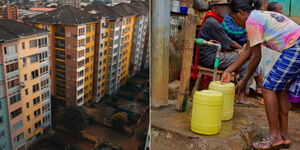The past two days have seen the opposition coalition, National Super Alliance (NASA) and the ruling Jubilee Party unveil their manifestos for the 2017 elections.
The two parties outlined their pledges and promises for the Kenyan people in the next five years.
Kenyans.co.ke examines both manifestos and outlines the plans for the two coalitions in nine major sectors in the country.
1. Health
Jubilee Party pledges to expand free maternity care to include government funded NHIF cover for every expectant mother for one year and to ensure all citizens above the age of 70 obtain health insurance cover through the NHIF.
NASA, on the other hand, pledges to create a Universal Health Fund that is aimed at changing the way healthcare is paid for by charging patients a small fee and having the government sorting the rest of the bill.
2. Education
In matters education, the ruling party has promised to expand the free primary school programme to include free day public secondary schools in Kenya starting from January 2018.
The Opposition on its part has promised to ensure that basic education (nursery-secondary) is free and accessible to all Kenyans.
3. Corruption
Regarding the fight on corruption, Jubilee pledged to make government more transparent and accountable through the digitisation of all government procurement; expand and deliver e-government services through the growing network of Huduma Centres.
The Opposition also had a similar pledge stating that they would develop a NASA Code of Conduct to ensure all elected or appointed officials under the coalition do not engage in corruption.
The code of conduct will bar government officials from doing business with the government directly or indirectly to avoid conflict of interest.
4. Food and Agriculture
Jubilee's manifesto pledges to reduce fertiliser subsidy, complete 57 large-scale dams, and support private sector irrigation.
NASA on their part promise to develop a national crop and livestock insurance system and the creation of an Agricultural Finance Corporation to "handle farmers better".
5. Housing
President Uhuru Kenyatta' s team promised to facilitate mass housing production of at least 500,000 affordable homes in 5 years across the country and to deliver homes faster and reduce the cost of construction by at least 50%.
Former Prime Minister Raila Odinga's team promised to reduce rents by enacting a law through which house rents could be controlled.
6. Security
If reelected, the Jubilee government promises to expand the Integrated Command and Control Centre (IC3) to cover other cities and towns. Jubilee also promised to strengthen the Anti-Terrorism Police Unit (ATPU) by acquiring more specialised vehicles.
NASA, if elected, promised to improve the police to population ratio and embark on withdrawal from Somalia to bring back Kenyan soldiers to protect the country from within.
7. Jobs
Jubilee vowed to ensure the creation of 1.3 million jobs every year and work with county governments to establish at least one industry in every county and to establish a government sponsored apprenticeship programme of up to 12 months for all University and Technical and Vocational Education and Training (TVET) graduates.
NASA on their part promise to develop more industries that will create employment for the youth.
8. Economy and Industrialization
The Ruling party promised to take measures to make the economy more broad-based, inclusive and modern, building Kenya’s infrastructure for the 21st century, to transform Kenya’s industry.
The Opposition on their part noted that they want to reduce the public debt and have a sustainable Gross Domestic Product (GDP) that would grow at 7% over a sustainable time period.
9. ICT
Jubilee promised to continue developing ICTs throughout the whole country. The coalition also pledged to develop training centres that will see young people trained on how to use ICTs for their own benefit.
NASA on their part promised to ensure adequate training for ICT teachers in all schools and having well built and equipped computer labs in all schools to cultivate an ICT culture in the country.












